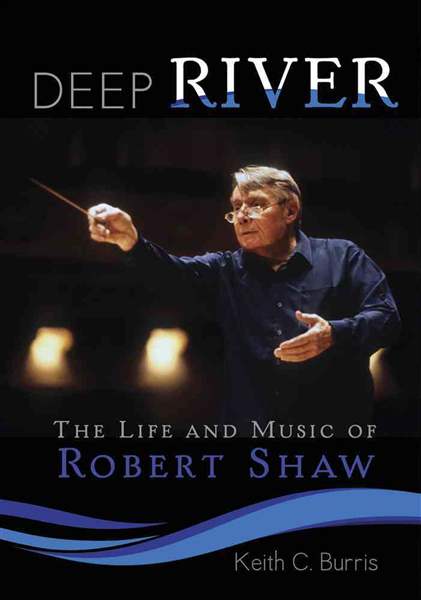
BOOK REVIEW
Musical giant elevated choral singing
12/1/2013
'Deep River The Life and Music of Robert Shaw' by Keith C. Burris (GIA Publications; 632 pages plus CD; $45)
Since Blade columnist Keith Burris returned to Toledo last summer, he has played an integral role in covering and commenting on local elections, sharing views and insights on Toledo and regional issues in his distinctive, Hemingwayesque style.
So you might understandably assume that politics fuels and defines Keith Burris. But there’s another, more esoteric side to the man, one that becomes clear reading his first biography, Deep River, The Life and Music of Robert Shaw, which was released in September.
Yes, that Robert Shaw (1916-1999), the brilliant, inspirational conductor who almost single-handedly transformed choral singing into a major element in American classical music.

'Deep River The Life and Music of Robert Shaw' by Keith C. Burris (GIA Publications; 632 pages plus CD; $45)
Burris spent a dense decade researching, interviewing, listening, and studying the self-made musician. Though he never met Shaw face-to-face, Burris, a baritone and veteran choral singer himself, developed an early fascination.

“Everyone knew his name, Fred Waring and Robert Shaw,” Burris said. “He was coming into his Father Music phase in America.”
Waring, progenitor of mainstreaming popular choral music, discovered Shaw, a preacher’s kid and self-taught college glee club leader, in 1938. Waring hired him and promoted him.
But, as Burris tells in detail in this thorough 631-page biography, Shaw seized that opportunity and took it to heights Waring would never have dreamed. Single-minded, totally devoted, and painstaking in his preparation, yet never secure, Shaw’s genius was to push and pull choral singing into a far higher echelon of American culture than it ever before had claimed.
Shaw also was relentless in exploring and promoting the deep spiritual impulses inside classical choral music.
“He wanted to be a part of the musical culture,” Burris said. “And he was. The thing that gratified him was the incredible increase in musical literature that happened as a result of his effort.”
Moreover, in countless cross-country and international performing tours, Shaw brought the profound thrill of hearing live masterworks by Bach, Brahms, Dvorak, Haydn, Verdi, and other major composers to audiences who otherwise would never hear such singing. His recording pace was equally breathtaking.
Never content with the most recent performance or recording, the upwardly-mobile Shaw sought and achieved long-term conducting internships with titans of the podium Arturo Toscanini and George Szell.
Somehow, Shaw managed to synthesize their very different approaches to music into a unique and influential approach to choral conducting, Burris said.
Shaw, the California native who lived first in New York, then Cleveland, before landing in Atlanta, which he turned into a musical power source, was never satisfied. But he still stands tall in the annals of American classical music.
“That musical culture he wanted in America did happen and he was an integral part of it. He was a moving force, as much as Bernstein and others,” Burris said.
But his many successes came at a high cost.
Shaw, a notorious drinker and womanizer, drove himself incessantly, ignoring his first wife and children to the point that his marriage ended in estrangement.
Conversely, Shaw’s infectious passion and clear capabilities in front of a choir drew attention, fascination, and a certain glorification from many acolytes.
As Burris worked his way through research, he had to break through a strong streak of protectionism by these former associates.
“There were things that made all those people uncomfortable in the book,” said Burris. “I thought, ‘What would Shaw do?’ ”
He faced the dilemma head on. And got some help from his subconscious. “I had a dream about meeting Shaw on a beach,” he said. “He asked me how the book was doing.”
To the author’s dilemma Shaw had a dream solution.
“He said, ‘Well, just tell the truth.’ “Then, he gave a characteristic cackle, and added, ‘Well, not all the truth.’”
Author Keith Burris will sign copies of his book during a public event from 4 to 7 p.m. Monday at Musical Resources, the choral music outlet at 2020 N. Holland-Sylvania Rd. For more information, call the store at 1-800-377-0234.
Contact Sally Vallongo at: svallongo@theblade.com.